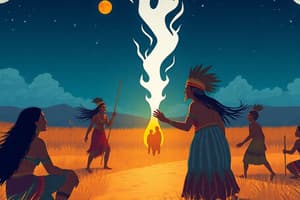Podcast
Questions and Answers
Which of the following is a characteristic of Philippine Indigenous Communities?
Which of the following is a characteristic of Philippine Indigenous Communities?
- Preference for individualistic lifestyles and decision-making
- Strong emphasis on communal living and decision-making (correct)
- Reliance on hierarchical leadership structures
- Adoption of modern urban living practices
What is a common feature of the cultural beliefs of Philippine Indigenous Communities?
What is a common feature of the cultural beliefs of Philippine Indigenous Communities?
- Emphasis on material wealth and possessions
- Preference for modern technology over traditional practices
- Strong connection to nature and natural resources (correct)
- Adherence to mainstream religious practices
Which factor has contributed to the preservation of traditional practices among Philippine Indigenous Communities?
Which factor has contributed to the preservation of traditional practices among Philippine Indigenous Communities?
- Desire for rapid modernization and urbanization
- Strong sense of cultural identity and pride (correct)
- Widespread adoption of Western cultural norms
- Reliance on external aid and intervention
Which of the following is a common practice in Indigenous Peacebuilding Traditions?
Which of the following is a common practice in Indigenous Peacebuilding Traditions?
What role do elders typically play in Indigenous Peacebuilding Traditions?
What role do elders typically play in Indigenous Peacebuilding Traditions?
What is the significance of oral tradition in Indigenous Peacebuilding Traditions?
What is the significance of oral tradition in Indigenous Peacebuilding Traditions?
Flashcards
Cultural Heritage
Cultural Heritage
Diverse languages, customs, and arts that define the heritage of Philippine Indigenous Communities.
Nature-Based Spirituality
Nature-Based Spirituality
A deeply spiritual perspective that intertwines with nature and emphasizes animism and respect for living beings.
Consensus-Building
Consensus-Building
A method involving all community members in decision-making to promote unity.
Oral Tradition
Oral Tradition
Signup and view all the flashcards
Preservation Factors
Preservation Factors
Signup and view all the flashcards
Role of Elders
Role of Elders
Signup and view all the flashcards
Study Notes
Characteristics of Philippine Indigenous Communities
- Rich cultural heritage marked by diverse languages, customs, and arts.
- Strong connection to ancestral land, often viewing it as sacred.
- Communities characterized by communal living and shared resources.
Cultural Beliefs of Philippine Indigenous Communities
- Spirituality deeply intertwined with nature, emphasizing animism and respect for all living beings.
- Belief in ancestral spirits that guide and protect the community, influencing daily practices and rituals.
- Rituals and ceremonies play a significant role in maintaining harmony with natural and spiritual worlds.
Factors for Preservation of Traditional Practices
- Strong sense of identity rooted in cultural history and community practices.
- Active community leadership and initiatives to teach younger generations traditional knowledge.
- Support from non-governmental organizations and cultural preservation programs that advocate for indigenous rights.
Common Practices in Indigenous Peacebuilding Traditions
- Consensus-building processes that involve all community members in decision-making.
- Rituals that promote reconciliation and healing after conflicts, often involving symbolic acts.
- Integration of traditional conflict resolution methods that emphasize harmony rather than punishment.
Role of Elders in Indigenous Peacebuilding Traditions
- Elders act as knowledge bearers, providing guidance rooted in tradition and history.
- Respected figures who mediate conflicts and facilitate dialogue within the community.
- Play a crucial role in preserving oral traditions and ensuring the continuity of cultural practices.
Significance of Oral Tradition in Indigenous Peacebuilding
- Acts as a means of transmitting history, values, and conflict resolution strategies across generations.
- Strengthens community bonds through shared stories and teachings.
- Essential for maintaining cultural identity and re-establishing trust after conflicts seem to persist.
Studying That Suits You
Use AI to generate personalized quizzes and flashcards to suit your learning preferences.




